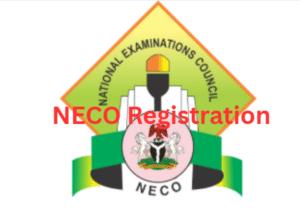Have you ever imagined walking confidently into the exam hall on time, fully prepared, only to find out you didn’t register correctly? It sounds like a nightmare, but sadly, it happens more often than you’d think. That single misstep can delay dreams, stress students, and even block admission opportunities. That’s why NECO registration isn’t something to rush or overlook. For many Nigerian students, NECO (the National Examinations Council) is one of the first real stepping stones to a future filled with possibilities. It’s more than just another exam.

Whether you’re aiming for university, applying for scholarships, planning to gain your SSCE result, or simply trying to complete your secondary school journey successfully, NECO plays a crucial role in the process. Here’s something important; NECO isn’t just a backup for WAEC, and it’s certainly not a “less serious” option. It’s a fully recognized national exam, accepted across Nigerian universities, polytechnics, colleges of education, and even in some international circles. And your success with it doesn’t begin on the day you sit for the paper, it begins the very moment you register.
This 2026 NECO Registration Guide is designed to take you from confusion to clarity. You’ll find everything you need to know, from key requirements and registration steps to deadlines, helpful tips, and the most frequently asked questions students like you often ask. We’ll show you how to avoid mistakes, stay ahead of deadlines, and make smart decisions that can influence your academic future. Because the truth is, this isn’t just about filling a form. It’s about securing a seat at the table of opportunity and making sure nothing stands in your way. Let’s get started by understanding what NECO really is and how it compares with other major exams like WAEC.
What Is NECO?
NECO stands for the National Examinations Council, and it’s one of Nigeria’s official examination bodies, just like WAEC. But while most people see NECO as an alternative to WAEC, it’s actually more than that. It’s a fully recognized exam that serves the same purpose: to certify that a student has completed secondary school and is qualified for further education or employment.
The NECO Senior Secondary Certificate Examination (SSCE) is written around June/July every year and is strictly for students in their final year of secondary school. Just like WAEC, it tests subjects across science, commercial, and arts classes, including Mathematics, English, and other core and elective subjects.
Now, how is NECO different from WAEC?
For starters, WAEC is a regional body, meaning it operates across several West African countries like Ghana, Sierra Leone, and Gambia. NECO, on the other hand, is 100% Nigerian, created by the Federal Government in 1999 to give students more access to credible exams without depending solely on WAEC. Also, NECO tends to be slightly more affordable, and many students say they feel more confident writing it because the questions are often more aligned with Nigeria’s local curriculum. Some even find the structure of the exams more straightforward. But don’t be mistaken, both NECO and WAEC are rigorous, standardized, and equally valuable when it comes to university admission or applying for jobs.
In fact, universities and polytechnics across Nigeria accept either of the two. You can even combine NECO and WAEC results if you don’t have all your required credits in one sitting. So, while some students take NECO as a backup, many others take it seriously as their main exam and with the right preparation, it could be your own winning ticket.
Why NECO Matters More Than You Think
Let’s be real, when people start talking about final exams in Nigeria, WAEC usually steals the show. It’s what teachers push, what parents proudly talk about, and what students rush to prepare for. But there’s a truth many students don’t realize until much later: NECO is not a fallback plan. It’s a powerful, legit opportunity all by itself. So if you’re planning to sit for NECO in 2026, don’t let anyone make you feel like you’re settling. You’re not. In fact, taking NECO might just be one of the smartest decisions you’ll make, especially if you’re focused on your future. Let’s talk about why.
1. NECO Can Get You into Nigerian Universities: If your dream is to attend a university, polytechnic, or college of education in Nigeria, NECO has got your back. Every single tertiary institution in Nigeria recognizes and accepts NECO results. So whether you’re aiming for Nursing, Law, Engineering, Mass Communication, or Fine Arts, your NECO result is your ticket in, just like WAEC. Some students don’t realize this until it’s almost too late. But now you know: NECO isn’t the “other option.” It’s a valid, powerful one. Your future school doesn’t care what exam board you used as long as your results are solid.
2. It’s More Than Just a School Exam, It Opens Other Doors Too: Imagine you’ve finished secondary school, You’re waiting for admission. Then boom! a job vacancy or a training program pops up. Or a scholarship opportunity. They ask for your O’Level certificate. Guess what? NECO qualifies you. Yes, NECO is recognized by most Nigerian employers, scholarship bodies, and training institutions. It doesn’t matter whether you got your certificate from WAEC or NECO, what matters is that you passed. So writing NECO isn’t just about sitting in an exam hall. It’s about collecting a key. A key that can open doors you didn’t even know existed yet.
3. It’s More Affordable for Many Families: Let’s talk about something we don’t say enough: exam fees are expensive. And with the way the economy is going, every naira counts. NECO often costs less to register than WAEC. And for many families, that small difference means everything. It makes the dream of writing an external exam possible. So if your parents are sacrificing to get you through school, choosing NECO isn’t a step down. It’s a smart, respectful, and financially wise step forward.
4. It Gives You a Second Shot at Success: WAEC didn’t go well? Missed a paper? Didn’t read enough? You’re not alone. It happens. But that’s not the end of your story. One of NECO’s biggest strengths is its timing. It’s usually written after WAEC, which gives you a second chance with more time to prepare, reflect, and do better. There are students across Nigeria right now sitting in classrooms, halls, or even their future offices, because they passed NECO, not WAEC.
When Does NECO 2026 Registration Begin?
The official registration date for NECO 2026 has not been announced yet, but based on past patterns, it typically starts between February and April. Keep in mind: Early registration is key. Don’t wait until the last minute. Schools usually handle the process, but private candidates must take full responsibility for their registration. Bookmark www.neco.gov.ng or follow NECO’s social media pages for the official announcement.
See also: Mistakes to Avoid in JAMB Hall
Who Is Eligible to Register for NECO 2026?
There are two main types of candidates:
1. Internal (School) Candidates: These are students currently in their final year (SS3) in secondary schools approved by NECO.
2. External (Private) Candidates: These are individuals not enrolled in a school, maybe you’re rewriting or you graduated earlier.
Regardless of your category, you’ll need:
- A valid NIN (National Identification Number)
- Your biodata (name, date of birth, state/LGA of origin)
- Passport photograph (white background)
- Subject selection (based on your academic focus
Step by Step Guide to NECO 2026 Registration
So, you’ve decided to sit for the NECO exam in 2026? Great decision! Now let’s walk you through exactly what you need to do step by step so you don’t miss anything important or get caught up in last minute confusion. Whether you’re registering through your school or as a private candidate, this guide will help you get it right the first time.
1. Get Your NIN (National Identification Number): This is the first step and it’s non negotiable. You can’t register without it. If you don’t already have your NIN, visit the nearest NIMC center (National Identity Management Commission) to get one. It’s free, but can take time depending on how busy the center is. So, don’t wait until the last minute.
Tip: Go early in the morning, and bring a form of identification like a birth certificate or school ID to make the process smoother.
2. Confirm Your Subjects: Before registration begins, talk to your school or a trusted teacher to know which subjects you’ll be writing. NECO allows most candidates to register for up to 9 subjects, which typically include:
- English Language
- Mathematics
- Civic Education
- One Nigerian Language (e.g., Yoruba, Igbo, or Hausa)
- Core subjects based on your academic path (Science, Art, or Commercial)
Tip: Don’t just copy what your friends are choosing. Pick subjects that match your strengths and the requirements for the career/course you want to pursue later. For example, if you want to study Medicine, Physics and Chemistry are must haves.
3. Visit the NECO Portal or Register Through Your School: Here’s where things differ depending on your category:
- Internal Candidates (i.e., school students): Your school will handle your registration. They usually collect details, photos, and payment from students and then process it in bulk.
- External/Private Candidates: You’ll need to register yourself by visiting the NECO official website: www.neco.gov.ng. Look for the SSCE External Registration section and follow the prompts.
4. Create Your NECO Profile: This is how NECO keeps track of your information. You’ll need;
- A valid email address you can access
- A working phone number
These will be used to send you updates about your registration and also to access your result later. Don’t use someone else’s contact info, you’ll be stuck if they stop helping.
5. Make Payment: How much is NECO registration in 2026?
- For school candidates, your school will let you know how much to pay. They usually collect the money and pay in bulk.
- For private candidates, the registration fee (as of 2025) is around ₦18,000. This amount may vary slightly in 2026.
Payment methods include:
- Bank branches
- Online transfer
- Remita platform on the NECO portal
Note: Keep your payment receipt or transaction ID safe, just in case you need to resolve any issues later.
6. Fill in Your Bio data Carefully: This is not the time to rush or guess. Double check all personal information:
- Full Name (must match your NIN and other official documents)
- Date of Birth
- Gender
- Nationality and State of Origin
- Home Address
- Preferred Exam Town
Note: Errors in this stage can lead to problems later, delayed results, wrong exam centers, or mismatched certificates. So take your time and ask for help if you’re unsure.
7. Upload a Recent Passport Photograph: Your passport photo is used for identification during the exam. Make sure:
- It’s recent (within the last 6 months)
- Taken on a plain white background
- Your face is clearly visible
- No caps, sunglasses, or filters (unless it’s for religious purposes)
Tip: Go to a professional photo studio that understands exam photo requirements.
8. Choose Your Exam Town: When registering, you’ll be asked to select your preferred exam town. This is where NECO will assign you a specific center. Choose a location that’s:
- Close to your home or school
- Easy to reach on exam days
- Familiar to you, especially if you’re travelling alone
Avoid picking a town just because it “sounds cool”, think practical.
9. Print Your NECO Photo Card: Once your registration is completed successfully, you’ll get a photo card. This is your proof of registration, and it contains:
- Your exam number
- The subjects you’ll write
- Your exam center
- The official exam timetable
Note: Print multiple copies and keep them in different safe places. You’ll need this card to enter the exam hall, and possibly for post exam procedures.
Final Tips for a Smooth NECO Registration
- Register early: Don’t wait until deadline week. The earlier you register, the more options you have (and fewer chances of errors).
- Use correct details: Your names, date of birth, and subjects should all be accurate.
- Ask questions: If you’re confused at any step, ask your teachers or visit NECO’s help section on their website.
- Keep copies of everything, receipts, confirmation messages, and photo cards.
Common NECO Registration Mistakes Students Make And How to Avoid Them
Let’s face it, no one wants to mess up something as important as their NECO registration. But it happens. Sometimes it’s from rushing, other times it’s from simply not knowing better. The good news? You don’t have to fall into those same traps. Here’s a real talk breakdown of the mistakes that can spoil your NECO registration and how you can avoid them like a pro.
1. Using Another Person’s Phone Number or Email: You’re about to register and someone says, “Just use my number jare, it’s faster.” It might seem convenient at the moment, but it’s a bad idea. Why? That number and email become your official contact for all NECO updates from exam changes to result release notifications. You might miss important messages because they’re going to someone else’s inbox or phone.
If anything goes wrong with your registration, it’ll be harder to fix without access to those contacts. Rather this is what you should do instead: Use your own active phone number and email address, even if you have to open a new Gmail account just for NECO. It’ll save you drama later.
2. Not Paying Attention to Subject Choices: Maybe your friends are all picking the same subjects, or someone tells you “those are the easiest ones.” But your subject combination should reflect what you want to study after secondary school.
Choosing the wrong subjects can stop you from getting admission into your preferred course. NECO is not just another exam, your result plays a big role in your university or polytechnic application. What to do instead: Before picking subjects, ask your school counselor or check the JAMB brochure to be sure of the right subjects for your future career path.
3. Spelling Your Name Wrong or Entering the Wrong Date of Birth: It may sound silly, but small errors like this cause big problems. If your name on your NECO result doesn’t match your NIN, WAEC, or school records, you may have to go through a long, stressful correction process later.
Universities and job applications check for consistency in your documents. Mismatched details could delay your admission or even affect NYSC registration.Take your time. Double-check the spelling of your full name, your date of birth, and other personal info. Cross-check with your NIN and WAEC to be sure they match.
4. Using the Wrong Type of Passport Photo: A clear, recent photo on a white background, that’s the rule. But some students use old photos, blurry pictures, or ones taken in poor lighting. Some even use filtered selfies. Don’t do it. Instead, Go to a professional photo studio that understands NECO photo requirements. Make sure the picture looks like you, is clear, and has a plain white background.
5. Waiting Until the Deadline to Register: You know that last-minute pressure? The one that makes everything feel rushed and chaotic? That’s what happens when you leave NECO registration till the very last week or day. Don’t just wait instead apply early and have peace of mind.
Conclusion
NECO plays a vital role in opening doors for Nigerian students, both for further studies and for future careers. Doing well in the exam is not just about passing; it is about building a strong academic foundation that can create opportunities beyond secondary school. With steady preparation, the right study resources, and a clear plan, every student has the chance to perform excellently. Rather than seeing NECO as a hurdle, it should be viewed as a stepping stone toward bigger academic and professional achievements.

